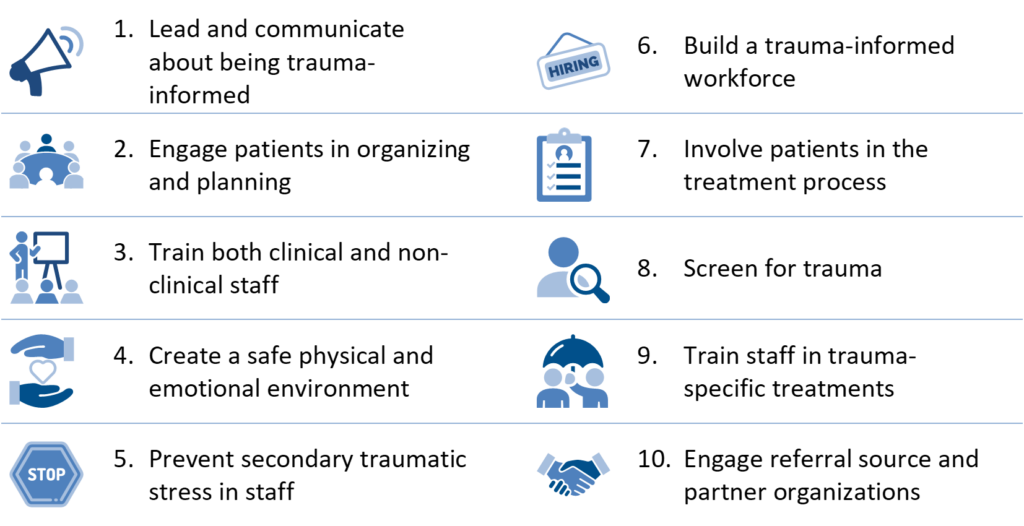Program At-A-Glance
Organization: Greater Newark Healthcare Coalition
Description: A coalition of community leaders seeking to improve health care quality and access in Newark, New Jersey.
Goal: Make Newark a trauma-informed city by 2020.
Key Program Features: Creating the ACE Impact Team to raise awareness of trauma; screening local elementary school students; equipping teachers with a framework for addressing trauma in the classroom; and developing trauma-informed care professional development opportunities for health care professionals.
As in many post-industrial cities, Newark has experienced dramatic challenges since the second half of the 20th century. A confluence of factors has resulted in the current landscape in which one third of the city lives in poverty, 72 percent of children are born into single female-headed households, and high rates of community and interpersonal violence burden residents.
In 2008, Newark faced a health crisis created by the abrupt closures of two of its five hospitals. In response, the New Jersey Department of Health convened the CEOs from the remaining hospitals to preserve access to services and to improve quality and outcomes. Health care leaders created a nonprofit regional health planning and advocacy organization, Greater Newark Healthcare Coalition (GNHCC). GNHCC’s mission is to advance health equity for residents of Greater Newark, with an understanding that trauma is one of the main underlying causes of poor health outcomes in the city.
“We know so much today about the science of brain development and the impact of toxic stress – it’s critical to work across sectors to optimize health and wellbeing.”
GNHCC’s trauma-informed care efforts are guided by a three-pronged approach: (1) convening and facilitating an Adverse Childhood Experiences (ACE) Workgroup to create a trauma-informed vision and plan; (2) developing health, education, and criminal justice system partners into trauma-sensitive professionals through tailored trainings; and (3) designing and implementing a core set of trauma-informed behavioral health services and supports for children and their caregivers as a pilot effort within two public elementary schools.
Anchor partners for GNHCC’s trauma-informed care efforts include: Rutgers University Behavioral Health Care (Rutgers UBHC); Children’s Hospital of New Jersey at Newark Beth Israel Medical Center (CHoNJ); and Building Responsible Intelligent Creative Kids (BRICK). As a nonprofit school management system serving some of the city’s poorest neighborhoods, BRICK is committed to creating a safe and supportive school framework. It embedded a Rutgers UBHC behavioral health clinician in one of its schools to lead trainings for teachers and other staff members on trauma-informed care, and screen children referred by staff for trauma. If a child is identified as needing services, the behavioral health clinician will either work with the child and his or her family at the school or refer them to an external partner for care. Lastly, the team’s anchor health partner, CHoNJ, is training medical residents to recognize and address the signs and symptoms of trauma in children. With support from Rutgers UBHC, CHoNJ has conducted five trainings for pediatric physicians-in-training.
Ingredients of Trauma-Informed Care
Based on expert insights, the Center for Health Care Strategies (CHCS) compiled these core organizational and clinical elements to guide practitioners in pursuing trauma-informed care. Many of these ingredients are incorporated into GNHCC’s approach, with select features described below.
SOURCE: C. Menschner and A. Maul. Key Ingredients for Successful Trauma-Informed Care Implementation. Center for Health Care Strategies, April 2016.
Select Features of GNHCC’s Trauma-Informed Approach
Based on ingredients of trauma-informed care outlined above, following are select aspects of GNHCC’s approach to addressing trauma.
 Leading and Communicating About the Transformation Process
Leading and Communicating About the Transformation Process
Convening and facilitating an ACE Impact Team with a diverse, interdisciplinary body of stakeholders to create a trauma-informed vision and implementation plan has been integral to Newark’s efforts to become a trauma-informed city. The ACE Impact Team engages university faculty, researchers and clinicians, community-based advocates, and organizations to develop and disseminate interventions that can reduce the incidence of ACEs among Newark’s children, and the aftereffects of childhood ACEs on adults.
The ACE Impact Team aims to make Newark a trauma-informed city that works to build resilience in children and families for better health outcomes by 2020. Their goals include:
(1) increasing community awareness of the negative impacts of toxic stress and what can be done to prevent and heal from such stress; (2) implement programs and services to break the cycle of childhood trauma and increase healthy child development; and (3) provide training, resources, and support to practitioners to improve health equity.
A key goal of the ACE Impact Team is to adopt a racial equity lens to better address trauma. GNHCC provides a training called “Undoing Racism and Community Organizing” to 30 members of the ACE Impact Team, which focuses on helping participants understand “what racism is, where it comes from, how it functions, why it persists, and how it can be undone.” Another core goal is the inclusion of youth voice— a pilot is currently underway with GNHCC and My Brother’s Keeper to create a train-the-trainer curriculum on trauma, ACEs, and how to build resiliency through creative expression and other activities. The training will be implemented with 10 male high school students, and includes stipends for the youth to develop a social media campaign, conduct school-based presentations for peers, and host community activities.
 Screening for Trauma
Screening for Trauma
At BRICK Academy, students in kindergarten through third grade are assessed for trauma using the Trauma Screening Referral Form, a tool designed by Rutgers UBHC. Each week, a group of teachers, administrators, and the behavioral health clinician convene for “referral meetings” to identify students who may be exhibiting problematic behaviors or have other indicators of trauma. The behavioral health clinician reviews referrals and places students in tiers based on predicted needs: (1) students who would benefit from school resources, e.g., a mentor or family liaison; (2) students who meet criteria for receiving services from the onsite clinician; and (3) students whose individual and family needs are beyond what the school clinician can accommodate. In the final instance, students are referred to an external behavioral health provider.
In the pilot’s first year (2016 -2017 school year), 16 children received individual or family therapy from the on-site behavioral health clinician. Twenty-six children spanning grades one through seven (16 boys, ages 5-11; 10 girls, ages 7-13) were assessed for trauma-related symptoms using the Trauma Symptom Checklist for Children. Seventy-seven percent of assessed students met clinically significant levels of at least one trauma-related symptom cluster. When considering two or more co-occurring symptoms, roughly half of assessed students reached clinically significant levels.
 Training Clinical and Non-Clinical Staff
Training Clinical and Non-Clinical Staff
BRICK’s behavioral health clinician also engages teachers in trainings on trauma-specific subjects, such as the impact of ACEs, and how to manage trauma-related behaviors in the classroom. Members of the ACE Impact Team take part in trainings as well. Recently, a member of the ACE Impact Team received training in the Nurtured Heart Approach, which focuses on helping behaviorally, emotionally, and academically challenged students. Using a train-the-trainer model, this member will train additional ACE Impact Team members, with the goal of spreading this approach to educators in the South Ward of Newark’s school district.
Finally, GNHCC is facilitating Newark’s transformation into a trauma-informed city by educating future generations of health care providers on the impact of trauma on health. GNHCC worked with Rutgers UBHC and CHoNJ to develop a trauma-informed care curriculum for pediatric residents that includes: (1) an introduction to trauma-informed care and ACEs; (2) trauma-informed care in practice (such as specific policies, practices, and tips for self-care); (3) shadowing during patient rounds; and (4) ongoing feedback to ensure that residents are applying trauma-informed care principles and practices appropriately.
Next Steps for Trauma-Informed Care at GNHCC
GNHCC hopes to greatly expand its trauma-informed trainings for health care professionals throughout Newark. A group of practitioners from University Hospital, North Jersey Community Research Initiative, and Horizon Blue Cross Blue Shield, as well as additional providers at Newark Beth Israel Medical Center has already expressed interest in participating. GNHCC will also work with its current partners, BRICK Academy and UBHC, to sustain and scale its work by advocating for policy changes, such as Medicaid reimbursement for school-based mental health services. GNHCC also has plans to work with BRICK to engage schools in Newark’s South Ward to replicate its approach to creating safe and supportive schools.
Trauma-Informed Care in Action Profile Series
This profile series features participants in Advancing Trauma-Informed Care, a national demonstration project designed to better understand how trauma-informed approaches can be practically implemented within the health care sector. LEARN MORE »





